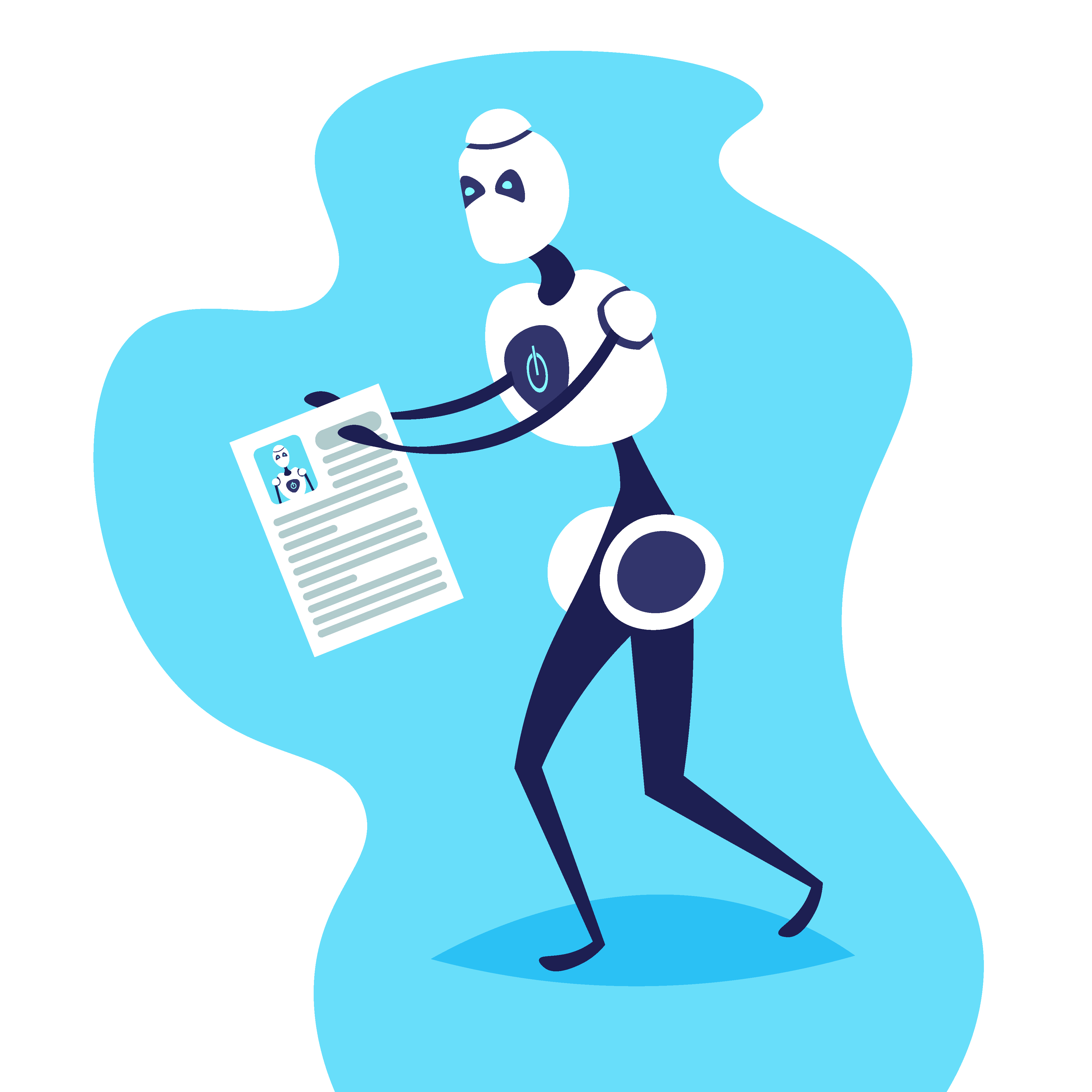How to tell if artificial intelligence is coming for your job

Artificial intelligence, robotic process automation, machine learning – these are all terms being bandied about more or less interchangeably when talking about the next level of technology. What we’re really dealing with is software that can ‘think’ for itself.
Right now, computer scientists are talking about ‘narrow AI’. The ‘singularity’ – the point when AIs start to design ever-more sophisticated versions of themselves without human interference – is probably 25 years away.
The great AI disruption
AI is disrupting practically every industry. It’s very likely that AI programmes will soon expand beyond the ‘narrow AI’ definition, too. Research firm Gartner predicts that AI will have eradicated 1.8 million jobs by 2020. However, it will also create 2.3 million new roles. So where will we find the trade-offs? Which parts of project management are vulnerable?
AI excels at repetitive, tedious tasks – those that require sifting through and interpreting large datasets. This means that the first job losses are occurring in manufacturing, logistics and transportation. But jobs have also started to disappear in administration across industry verticals and in the professional services. Legal, accountancy and HR services are all ripe for disruption – and in the case of the latter, AI is already making a mark in applicant selection and tracking, for example.
The myth of the robot project manager
Part of the project management role inevitably involves tedious, administrative tasks. If that makes up a lot of your job, you might be worried that the right AI could replace you. One particular hotspot might be the more finance-and-admin, supportive type of project management office (PMO). Time tracking, invoice handling and simple scheduling are all ripe for automation.
But the reality is that AI is not going to be able to do the whole job in the near- to mid-term future. (Check out the APM’s paper on The robot professional for more insight on why.) Project management is as much about human interaction as it is about spreadsheets and PowerPoint decks – and computers are famously terrible at that. Stakeholder management? Forget it.
Most AI implementations also don’t work without human beings to input the data it crunches – the dream is automatic data generation from technologies like the Internet of Things, but that’s a way off. Although advances are being made in getting AI to function with partial information, for the most part the current systems draw the wrong conclusions and perform tasks incorrectly if the data it’s drawing from is erroneous or incomplete.
That means humans are also critical for handling exceptions. In some robotic process automation (RPA – see below) implementations, 80% of ‘transactions’ run smoothly, but humans still have to handle the ones where the data or the context aren’t 100% ‘normal’. And, of course, they’re critical for roles such as leadership, vision and ethical behaviour.
The right tools for the right task

So instead of worrying, project managers should be thinking about how the right AI applications could provide them with the perfect assistant. In recent years there’s been a shift towards data-driven PM, using analytics to mitigate for both expected and unexpected obstacles. This approach incorporates dynamic scheduling, risk
analysis and project control to ensure projects hit deadlines and stay on-budget. AI can chew through reams of data like no human ever could, making it a great tool for the data-conscious project manager.
Here are some of the technologies in the AI arsenal that are being applied to PM:
- Robotic process automation (RPA): the back office of AI applications, taking over repetitive, high-volume tasks with easy rule-based applications that used to be done by humans. PM applications include data maintenance and project reporting.
- Machine learning: a subset of AI where software analyses big data to automatically extract the information necessary to make predictions. In PM, this could mean high-level activities like predicting task timings and budgets; assigning tasks to the right team member; or figuring out when deadlines are going to be missed.
- Natural language processing (NLP): Amazon’s Alexa and Apple’s Siri are only possible because of the advances in this field, getting computers to understand how human beings talk. This could be ideal for processing a lot of the data produced in projects – such as emails, calendar entries and conversations on chat services such as Slack.
- Virtual agents/chatbots: NLP underpins these digital assistants, too. Many of them operate in narrow use-cases, where context is well-defined and datasets small – for example, taking an order for fast food online. Soon virtual assistants could become the front-of-house for other AI applications. For example, when a project manager wants to assign tasks to the right team members, she will just ask the chatbot to pass on the instructions in bulk. The bot will apply an array of AI technologies, from NLP to machine learning algorithms, to send the right tasks to the right people.
- Modelling: So much of PM is about envisioning outcomes and then finding the processes that will get there. With advanced modelling systems like digital twins, this kind of thinking will become much easier. A digital twin is a virtual replica of something in the real world, whether that’s a physical asset, a business process or even a project. Project managers can use digital twin modelling to envisage the final outcome as well as the workflows and processes that will achieve it.
The robot PM assistant
The positive view of AI is that tedious back-office tasks are taken care of, leaving people with the space and time to be creative and innovative. If you’re spending half your time creating spreadsheets, writing emails and compiling status reports, how much more could you do, and how much better, if admin was only a third or a quarter of your job?
There are key areas where AI could lift the burden of boredom, reduce the high level of errors associated with repetitive jobs and make PM more cost- and time-efficient:
- Compliance mapping: managing compliance with regulations is a continuous task for every business and an integral part of risk analysis in PM. Yet businesses and project managers regularly employ just a single spreadsheet to handle this complex job. AI can analyse large datasets and extract meaningful recommendations automatically to help make this process more efficient and effective.
- Decision support: well-informed and effective decisions quickly are vital for projects. If a project manager is trying to read and collate information from a dense and complex dataset – streams of conversation on chat services, emails, calendars, spreadsheets, PowerPoints, PM software – that job gets harder. AI techniques can coordinate how data is delivered, analyse trends, make predictions, develop data consistency and even anticipating the project manager’s needs. Think of it as a chess computer, showing you potential outcomes from your move, several moves ahead.
- Resource allocation: for example, a machine learning algorithm gathers data about team members, their skills and ways of working, and assigns the right task to the right person. By incorporating scheduling as well, AI can also ensure that the person is available and not overworked – and even predict and manage upcoming idle periods or times of increased activity.
- Predictive analytics: is your current project going to be successful? Coming up with a well-reasoned answer is tough. All too often, risks are not assessed until they actually crystallise and even risk analysis specialists can be stymied by the inherent complexity of large projects. A number of PM software solutions already include predictive analytics that will process raw data and make forecasts by analysing patterns and trends.
- Collaboration: Collaboration tools are already widely in use in PM, encompassing functions such as chat, document sharing and team-wide updates. AI will make these functions more intuitive. A virtual assistant, for example, could schedule a meeting for the project manager by accessing and analysing everyone’s calendar, sending out the invitations and dealing with any conflicts. The bot would come back with just the place and time, instead of the headaches of organising it.
AI for PM
As it matures – and our use of it becomes more sophisticated – AI will be a growing aid to effective project management. There are hurdles to overcome as the technology develops, such as in the area of data input. Even the cleverest virtual assistant imaginable won’t be able to schedule a meeting if employees aren’t keeping their calendars up-to-date, for example. The quality of the input data when migrating to an AI application and issues of data compliance and data privacy will all need to be ironed out as well.
But on its current trajectory, there is no doubt that AI will mature to be an ever-increasingly important tool in project management.
You may also be interested in
- Case study - Gobeyond Partners - Putting humans at the heart of transformation
- Projecting the Future: the fourth industrial revolution
Brought to you by Project journal.
Image: ProStockStudio/Shutterstock.com


2 comments
Log in to post a comment, or create an account if you don't have one already.
Thank you for sharing your knowledge Brid-Aine, very interesting read!
I'm sure that AI will help each industry sector like E-commerce, Stocks, Automobiles etc. The Deep learning and it's neural network complex algorithms will do every thnig on automation in coming years. So, far we have old AI technique bots workings in different sectors of industries which have flaws but helping people to automate their works like Poshmark Pro Tools https://poshmarktools.com/ software.